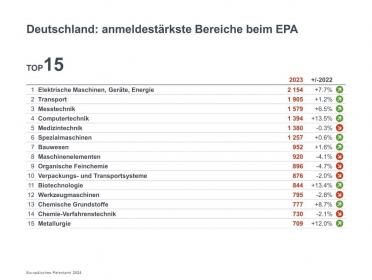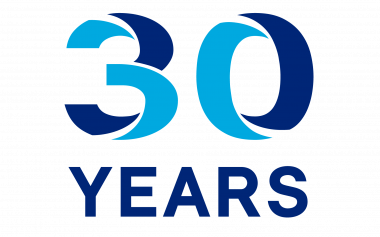Europäischer Patent Index 2023: Wieder mehr Anmeldungen aus Deutschland
Der am 19. März veröffentlichte Patent Index 2023 zeigt eine neue Höchstmarke: Beim Europäischen Patentamt (EPA) wurden im vergangenen Jahr insgesamt 199.275 Patentanmeldungen eingereicht, was einem Anstieg von +2,9 % gegenüber dem Vorjahr entspricht. Der positive Trend aus den Jahren 2021 (+4,7 %) und 2022 (+2,6 %) hat sich weiter fortgesetzt. Patentanmeldungen stehen als wichtiger Frühindikator für Investitionen der Unternehmen in Forschung und Entwicklung. Zugleich unterstützen sie die Vermarktung von Erfindungen.
Aus Deutschland wurden beim EPA im vergangenen Jahr 24.966 Patentanmeldungen eingereicht, +1,4% mehr als im Vorjahr, die erste Zunahme nach drei Jahren mit stagnierendem Anmeldeaufkommen. Deutschland bleibt an der Spitze der europäischen Staaten und steht im weltweiten Ranking der europäischen Patentanmeldungen weiterhin auf dem zweiten Platz hinter den USA. 2023 stammten rund 12,5% aller beim EPA eingereichten Anmeldungen aus Deutschland.
Starkes Wachstum aus China und Korea
Die fünf Länder mit den meisten europäischen Patentanmeldungen im letzten Jahr waren die USA, auf die 24% des gesamten Anmeldeaufkommens entfielen, Deutschland, Japan (11%), China (10%) und die Republik Korea (6%). Der Anstieg der Patentanmeldungen im vergangenen Jahr beruht vor allem auf der weiterhin starken Zunahme aus Korea (+21% zum Vorjahr) und China (+8,8% gegenüber 2022). Damit rückt das Land auf den 5. Platz im Länderranking vor.
Technologietrends: Deutschland weiterhin in der Mobilität führend – starkes Wachstum bei Elektrische Maschinen/Energie, in der Computertechnik und Biotechnologie
Die zahlenmäßig stärksten Technologiefelder bei den Patentanmeldungen aus Deutschland waren erneut die traditionell patentintensiven Bereiche Elektrische Maschinen/Geräte/Energie, Transport (einschließlich der Fahrzeugtechnologien) sowie Messtechnik. Daneben wurden insbesondere in zukunftsträchtigen Segmenten wie der Computertechnik (+13,5%) und der Biotechnologie (+13,4%) wieder deutlich mehr Patente angemeldet. Im Länder-Ranking für die Biotechnologie ist Deutschland die Nummer zwei hinter den USA. Unter den 25 anmeldestärksten Unternehmen in diesem Bereich finden sich fünf deutsche Firmen, angeführt von BASF, das auf dem achten Platz rangiert. In der Computertechnik liegt Deutschland auf Rang 3 hinter den USA und China. Unter den Top 25 in Computertechnik befinden sich mit Siemens und der Fraunhofer-Gesellschaft ebenfalls zwei deutsche Anmelder.
In seinen traditionell anmeldestarken Technologiesegmenten hat das „Autoland Deutschland“, im Jahr 2023 seinen Spitzenplatz verteidigt, besonders im Bereich Transport: Mehr als 20% aller im vergangenen Jahr eingereichten europäischen Patentanmeldungen in diesem Sektor stammten aus Deutschland. In der Messtechnik, die auch die für die 4. Industrielle Revolution wichtigen Sensoren umfasst, meldeten nur US-amerikanische Unternehmen mehr Patente an als die deutschen Firmen (+6,5% im Jahresvergleich). Auf dem Gebiet Elektrische Maschinen, Geräte, Energie steht Deutschland weltweit an dritter Stelle beim EPA, hinter den Spitzenreitern China und der Republik Korea. Hier stiegen die Patentanmeldungen aus Deutschland um +7,7% gegenüber dem Vorjahr. Die Firma Robert Bosch liegt im internationalen Vergleich auf Rang 12 der Patentanmelder beim EPA für Erfindungen in der Batterietechnik, einem Teilgebiet von Elektrische Maschinen / Geräte / Energie.
Europäisches Patentamt












